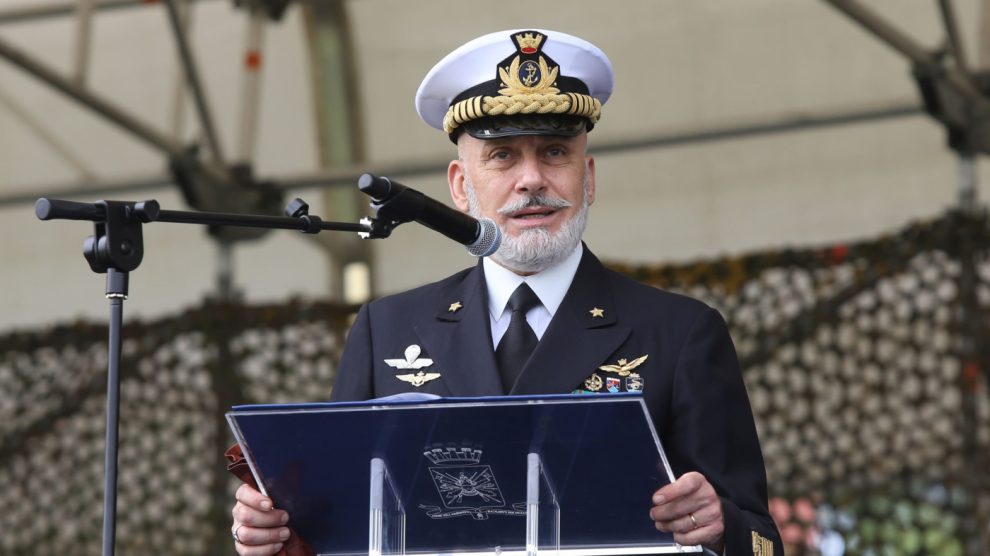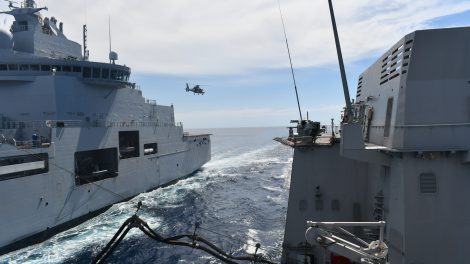The Med’s heating up. “There is constant competition in the Mediterranean. The old idea of peace no longer exists: we go straight from competition to crisis, which risks turning into conflict.” Thus spoke Admiral Giuseppe Cavo Dragone, head of the Italian Armed Forces, in an interview to Repubblica where he detailed the recent naval standoff between Russian and NATO forces off the coast of Italy.
- Over the past weeks, three Russian ships – including the Varyag cruiser, the flagship of the Pacific Fleet – sailed into the Adriatic Sea for the first time since the invasion of Ukraine.
- Allied forces, including NATO’s Standing Maritime Group Two and the US Truman carrier, were patrolling these waters.
What happened? The Russian Navy certainly didn’t set up a blockade of a key choke point, the Otranto Channel, as some outlets reported. And what went down wasn’t a confrontation between NATO or US forces and the Russians, noted Admiral Cavo Dragone. “It was a patrol operation, immediately countered by the action of the Italian Navy.”
- As soon as they caught wind of the Russian presence, the closest Italian units were immediately dispatched to shadow them and analyse their moves. Arguably, noted the admiral, the Russian forces were doing the very same, testing the reactiveness and signals response of NATO forces.
Building up presence. Such episodes have increased in frequency since the invasion of Ukraine, said Mr Cavo Dragone, who recounted how the Russian forces are increasing their assets in the Mediterranean.
- “Until 2015, there was only one Russian ship in the Mediterranean. Then, through substantial investments, [the Russians] restructured the Syrian port of Tartous,” which Beirut granted them through a 50-year concession in 2017. Thus, in 2021 there was a dozen Russian units; that number climbed to as many as twenty ships, deployed after the invasion.
Italy’s response is usually “very dynamic, with contributions from all the allies,” he continued. “In April, two [Russian] Kilo submarines approached the NATO fleet in the Ionian Sea but were spotted by Italian frigates from day one. We kept them on sonar for ten days, then a French unit took over from ours. In the submarines, they heard our sonars pinging them – that is, framing them: they realised they couldn’t escape detection, and they left.”
- Rome is bolstering its Navy to deal with what the admiral called a “major underwater threat, which will become even more pressing. To that end, we intend to build four submarines and two FREMM frigates. However, we lack an aircraft with the ability to detect submarines and great autonomy,” he warned.
Look out: when peace will be achieved in Ukraine, continued Admiral Cavo Dragone, “there will be a major reverberation in the Mediterranean, and we will have to deal with it for a long time. Because this is where Moscow’s sources of supply are, because North Africa is an area that the Russians want to destabilise and we must move to prevent this. From the coastal states to the Sahel, Russian activity is known and will manifest itself with greater intensity in the coming years.”
What about Ukraine? The head of the Italian Army doesn’t believe a military solution is possible. “Kyiv will never be taken, but the Ukrainians will not have the strength to regain all the territories occupied by the Russians,” he argued. He does expect a breakthrough – “I cannot say when, perhaps October” – as “the losses on the ground are terrible and [the Ukrainian people will realise] it has become a static war, with catastrophic devastation for the civilian population.”
- Mr Cavo Dragone also believes that come autumn, the impact of Western sanctions on Russia will become more evident. “I hope they realise that the death toll has become unbearable,” he concluded.





